
March 2011
For Workers Revolution Against the Qaddafi Police State!
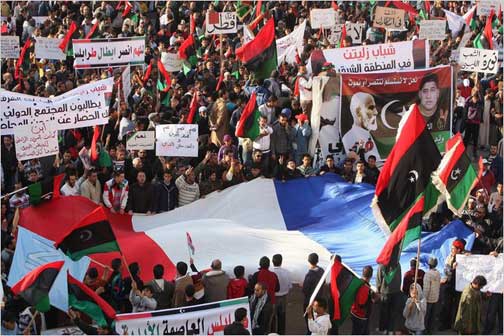 Libyan rebel rally in Benghazi,
March 23, featuring flags of France and of
the monarchy installed by the British
after World War II. (Photo:
EPA)
Libyan rebel rally in Benghazi,
March 23, featuring flags of France and of
the monarchy installed by the British
after World War II. (Photo:
EPA)MARCH 15 – Over the past three months, a wave of popular uprisings has spread across Arab North Africa and the Near East, toppling U.S.-backed dictators in Tunisia and Egypt and shaking monarchies, emirates and other bonapartist regimes around the region. The imperialists have sought to preserve their domination by keeping both the governments and the opposition under their thumb. Even when they have to had sacrifice one or another used-up strongman to the revolt of the working masses, they make sure power stays in the hands of the army. While much of the left joins the bourgeoisie in hailing victorious “revolutions,” The Internationalist has pointed out that the military/police apparatus of these dictatorships is still running the show under the new pseudo-“democracy.” In order to put an end to pervasive poverty and autocratic rule, we have insisted, it is necessary to turn popular uprisings into workers revolution.
For the most part, these upheavals have remained at the level of mass demonstrations and strikes. But in Libya, where Col. Muammar al-Qaddafi has ruled since overthrowing the British-imposed monarchy in 1969, fighting broke out almost from the start. Although Qaddafi was once a bugbear of U.S. rulers, since the late 1990s he sought to buy his way into the good graces of imperialism. The Libyan leader suppressed Islamic fundamentalists, staunched the flow of African immigrants to Europe, invested in major “multinational” firms, invited in European and U.S. oil companies and carried out “free market” economic “reforms,” while always ruling over the toilers with an iron fist. The Great Socialist People’s Libyan Jamahiriya, as he calls his regime, far from being a “state of the masses” is a cover for capitalist exploitation by the Qaddafi clan and its partners. After 41 years of his heavy-handed, capricious rule, when events in Tunisia and Egypt broke the fear barrier, many youth and working people were ready to rebel.
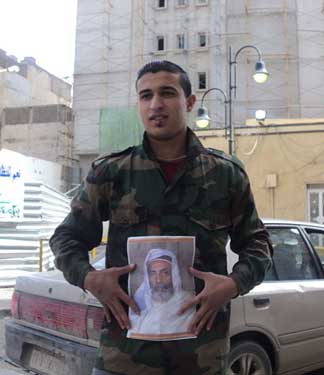 Leftist apologists for
Libyan rebels claim that waving monarchist
flag doesn’t mean support for the
monarchy. Oh no? Right: Benghazi youth
with photo of King Idris, whose base was
eastern region of Cyrenaica.
Leftist apologists for
Libyan rebels claim that waving monarchist
flag doesn’t mean support for the
monarchy. Oh no? Right: Benghazi youth
with photo of King Idris, whose base was
eastern region of Cyrenaica.
(Photo: Maher27777/Wikipedia)
But that is only part of the story. The situation in Libya differs significantly from that in other countries in the region in several ways. While feeding off the desperation and pent-up rage of unemployed youth and hard-pressed workers, this revolt was organized and led from the outset by CIA-tied exile opposition groups and the traditionally monarchist local bourgeoisie in eastern Libya, long hostile to Qaddafi. It was soon joined by top officials of the Qaddafi regime, among them the justice minister and the long-time interior minister (in charge of the police). Moreover, a key role is played by Islamist elements, including the jihadist Libyan Islamic Fighting Group. These ruling-class elements, just as reactionary as Qaddafi, are now appealing for U.S. military action. (Air strikes, please, not troops – for now.) Some rebels are adamant against any foreign military intervention, yet plebeian youth yearning for secular democracy are being used by bourgeois opposition leaders for an agenda that can only be pro-imperialist and anti-democratic.
Many leftists in the West recall when Qaddafi was the personification of radical Arab nationalism, with an Islamic twist. But lately the Libyan Leader has praised Tunisian dictator Zine el Abidine Ben Ali and Egyptian dictator Hosni Mubarak and denounced the masses for bringing them down, saying this produced terror “as if it was the Bolshevik or the American revolution.” Still, Libya was not simply a U.S. neo-colony and the imperialists were never quite comfortable in their embrace of the leader of the Green Revolution, even after he was reborn as a disciple of “neoliberalism.” On top of which, Qaddafi has refused to go quietly into the night and vowed to fight to the last bullet. So unlike in Tunisia and Egypt, President Barack Obama is calling openly for Qaddafi’s departure, freezing Libyan assets and pushing through a United Nations Council resolution calling for the International Criminal Court (whose jurisdiction the U.S. rejects) to investigate him for possible war crimes – while preparing military action.
As U.S. Secretary of State Hillary Clinton hails the Libyan “revolution,” the imperialist media are in full battle mode. “Massacres” by government troops are reported with inflated tolls of civilian casualties when in fact there are battles with combatants dead on both sides. Stunning “victories” by the rebels are proclaimed when government forces simply withdraw after probing attacks. (Libyan military officers who have joined the rebels, in contrast, understand that Qaddafi is holding back in order to avoid mass casualties that would be used as an excuse for U.S./NATO intervention.[1]) There is silence about racist assaults in rebel-held areas on black African migrant workers who are accused of being pro-government “mercenaries.” And although at least 130 Western reporters are holed up in the capital, Tripoli, there is hardly a mention of mass demonstrations of thousands of government loyalists taking place under their noses. Qaddafi is demonized as a madman who has completely lost touch with reality.
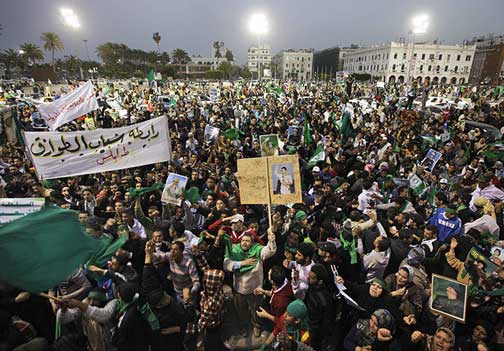 Pro-Qaddafi
rally in Tripoli’s Green Square, March
4. Imperialist media in full battle mode
don’t report support for Libyan regime
even when it takes place right under
their reporters’ noses.
Pro-Qaddafi
rally in Tripoli’s Green Square, March
4. Imperialist media in full battle mode
don’t report support for Libyan regime
even when it takes place right under
their reporters’ noses.
(Photo: Ben Curtis/AP)
It all recalls the way Serbian strongman Slobodan Milosevic – who was indeed a nationalist butcher – was portrayed as a monster as the U.S. geared up to bomb Serbia in support of the Kosovo Liberation Army in 1998-99. The fact that the Kosovo Albanian nationalists were slaughtering Serbs was swept under the rug, including the fact that KLA commander (and later Kosovo prime minister) Hashim Thaçi was involved in drug and sex trafficking and running a gruesome ring that was killing Serb prisoners in order to harvest their organs and sell them. Even years later, the chief prosecutor at the Yugoslav war crimes tribunal Carla del Ponte said she was prevented from investigating these charges.[2] For that matter, how about an investigation for war crimes of U.S. presidents George H.W. Bush, Bill Clinton, George W. Bush and Barack Obama, each of whom is responsible for the wanton murder of far more civilians than Qaddafi (or even Milosevic)? Don’t hold your breath waiting: “international law” is a fiction and plaything in the hands of the dominant powers.
At present there are seesaw battles around oil ports and along the coastal road between what is described as a “ragtag rebel army” and pro-Qaddafi militias. The government has managed to blow up ammunition depots in Benghazi and Ajdabiya, while untrained rebel volunteers are using up ammo with abandon. In western Libya, the city of Zawiyah is under government siege, with the working population locked down and subjected to indiscriminate fire. The armed clashes have escalated to outright civil war, while Washington repositions its forces, moving warships into the Mediterranean. This “robust diplomacy,” as Secretary of State Hillary Clinton likes to call it, gives the Pentagon and White House time to develop “options” for future military action. That could include a “no fly zone” (beginning by knocking out Libya’s air force and anti-aircraft defense systems), blocking Libyan telecommunications or sending in troops (to provide “humanitarian” aid, to be sure).
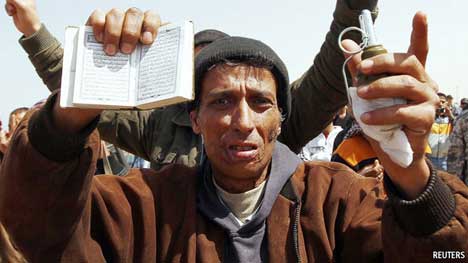 Libyan
Islamist rebel fighter with Koran and
grenade.
Libyan
Islamist rebel fighter with Koran and
grenade.
(Photo: Reuters)
Unlike many leftists who once sang the praises of Qaddafi, we in the League for the Fourth International never politically supported Arab nationalism and have always fought Islamic reaction. At the same time, we denounced Ronald Reagan’s 1986 bombing of Libya, a wanton attempt to assassinate the Libyan leader that killed his year-old daughter and several hundred Libyans. Many democratic-minded youth may have joined the initial protests unaware of their sponsorship by pro-imperialist forces. In the cities of western Libya and the Berber (Amazigh) regions, the uprising may at first have had a character of communal self-defense. But in the present civil war, communists oppose both the Islamic-populist strongman Qaddafi and the pro-imperialist, monarchist and Islamist opposition, calling instead for workers revolution. In the case of military intervention by the U.S. and its NATO allies, in whatever guise, class-conscious workers must defend Libya and fight to defeat the imperialists and their Libyan puppets.
In Libya more than anywhere else in the Middle East today, the class contradictions in the popular uprisings for “democracy” have come to the fore. In earlier cases, union-led protests (in Tunisia) or workers strikes amid huge mass mobilizations (Egypt) were key in driving out the dictators. Yet even after some reshuffling of personnel at the top (such as installing new prime ministers) the apparatus of the dictatorship remains in place. In those cases, the imperialists had their agents among the protesters, but they were only one element in a vastly larger upheaval. To be sure, many Libyans voiced grievances similar to those of protests from Algeria to Bahrain, but in this case bourgeois reactionaries looking to imperialism are in control. Everywhere, the vital element of a revolutionary proletarian leadership has been absent, and this is what must urgently be built. Only by fighting on a working-class program can Qaddafi’s threadbare populist appeal be undercut and the pro-imperialist politics of the bourgeois opposition be defeated
Libya Uprising: Bourgeois Opposition Forces Ascendant
The imperialist media have sought to portray events in Libya as one more spontaneous mass popular uprising just like others in the Middle East. But in fact the February 17 Libyan “Day of Rage” was announced well in advance by the National Council for the Libyan Opposition (NCLO), which operates out of Britain and the U.S. Already on February 9 the Saudi-owned pan-Arab newspaper Asharq Al-Awsat, printed in London and New York, reported on the plans, and that Qaddafi “privately met with Libyan political activists, journalists, and media figures” while “warning against the consequences of participating in any potential disturbances.”
The uprising broke out in Benghazi, capital of the region of Cyrenaica which had been the base of King Idris, head of the Senussi order of Sufi Muslims. Having opposed the 1911-1945 Italian occupation of Libya from a comfortable perch in Cairo, at the end of World War II Idris was installed by the British as king of Libya. On February 17, protesters immediately began flying the flag of the Libyan monarchy (red, black and green with a white crescent and star). Leftist supporters of the rebels argue that this does not represent nostalgia for Senussi rule. Yet photos from February 17 show demonstrators in Benghazi carrying portraits of King Idris. Indeed, a main component of the NCLO is the Libyan Constitutional Union of Muhammad as-Senussi, considered by royalists to be the legitimate pretender to the Libyan crown. On February 24, Al Jazeera English interviewed “Crown Prince” as-Senussi saying he called on “the international community to help remove Gaddafi from power and stop the ongoing ‘massacre’.”
Another favorite on Al Jazeera these days and a main component of the Libyan opposition (as well as co-founder of the NCLO) is the National Front for the Salvation of Libya (NFSL). Founded in 1981, this outfit has been an instrument of the American CIA from its inception under Ronald Reagan, as well as being financed by Saudi Arabia.[3] In 1984, the NFSL attempted to murder Qaddafi but was foiled. The NFSL’s last conference (July 2007) was held in the United States. The Salvation Front was the main source of news about the Libyan revolt in the first days before correspondents arrived and is part of the opposition coalition in Benghazi today.[4]
Along with the monarchists and CIA assets, a big chunk of the opposition consists of Islamic fundamentalist figures and currents. In the days leading up to February 17, the regime released 110 Islamists from jail among other steps in an effort to head off protest. But on February 15, it arrested Fathi Terbil, a lawyer representing the families of Islamists who were killed in a 1996 prison massacre. Many had been jailed in the suppression of a 1990s insurgency in Cyrenaica by the Libyan Islamic Fighting Group, some of whom had fought against Soviet troops in Afghanistan – when they and Osama bin Laden were being bankrolled by the U.S. The arrest touched off an angry protest that set the stage for the explosive “Day of Rage.” While almost no Islamic chants were reported earlier in Tunisia, and scattered attempts by the Muslim Brotherhood to chant its slogans in Cairo fell flat, on February 17 in Benghazi, Libya one of the main chants was “There is no God but Allah, and Muammar [al-Qaddafi] is the enemy of God.”
Since Western media have ridiculed Qaddafi’s claims that the uprising is Islamist, it is worth quoting a London Economist (5 March) report:
“[T]he Islamists and secular liberals, with the shared aim of dishing the dictator, have struck up an alliance….
“Based on relationships forged in the notorious Abu Salim prison, a loose Islamist front is emerging. Old-time sheikhs and graduates schooled in Salafi pietism (who seek to emulate the behaviour of the Prophet’s comrades)[5] have teamed up with Muslim Brothers who temper their enthusiasm for sharia law with pragmatism in their dealings with non-Muslim people and governments.
“The jihadists take a more rigid line, saying they will tolerate anything – as long as it does not conflict with Islam…. The Islamists grumbled when an American-trained secular professor was given the education portfolio on the new council.…
“All in all, the Islamists are gaining ground. Mosques, hitherto closed between prayer times to limit public assembly, are open round the clock. The imams have started to preach politics, offering their pulpits to Islamists tortured by the regime. The clerics have also begun to dispense welfare.”
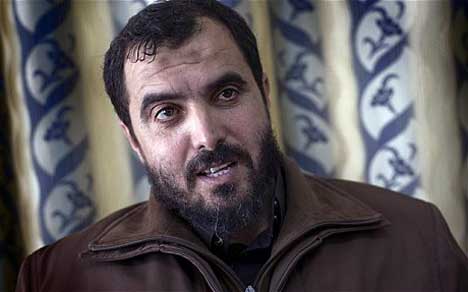 U.S. and Islamists, back together
again. Abdul Hakim al-Hasidi, leader of
Libyan rebel forces in Damah, fought with
CIA-sponsored mujahedin (holy warriors)
against Soviet Army supporting Afghan
reform regime in 1980s. Trotskyists hailed
Red Army intervention in Afghanistan,
opposing Islamist reactionaries then and
now.
U.S. and Islamists, back together
again. Abdul Hakim al-Hasidi, leader of
Libyan rebel forces in Damah, fought with
CIA-sponsored mujahedin (holy warriors)
against Soviet Army supporting Afghan
reform regime in 1980s. Trotskyists hailed
Red Army intervention in Afghanistan,
opposing Islamist reactionaries then and
now.
(Photo:
Agence France-Presse)
Meanwhile, the New York Times (8 March) reports that the military leader of the rebellion in the eastern city of Darnah, Abdul Hakim al-Hasidi, is a veteran of the anti-Soviet war in Afghanistan and of the Islamic insurgency in Libya. As we have noted, Washington has no compunctions about allying with the most extreme Islamic reaction in the service of counterrevolution and furthering its imperial aims. Now imperialism and Islamism are making common cause again.
Proletarian revolutionaries, in contrast, hailed the Soviet Army’s 1980s intervention in Afghanistan against U.S.-backed mujahedin and denounced the Kremlin pullout, a capitulation to imperialism that paved the way to the counterrevolutionary destruction of the Soviet Union. When the Soviets pulled out we offered to send an international brigade to help fight against the “holy warriors” who threw acid in the faces of female university students and gunned down educators for the “crime” of teaching girls to read and write. In Algeria, revolutionary Marxists (Trotskyists) have opposed the murderous military and Islamist insurgents alike, both of whom wantonly slaughtered unveiled women, trade unionists and communists. In Egypt, Tunisia, Libya, Iran and elsewhere Trotskyists oppose all political alliances with the forces of religious reaction – or with any bourgeois political currents – as we fight for the revolutionary political independence of the working class and rural and urban poor from their exploiters.
A third and increasingly prominent component of the rebel coalition consists of defectors from the Qaddafi regime. A number of the Brother Leader’s top deputies quickly joined the rebellion, so quickly in fact that it leads one to wonder if the shift in loyalties wasn’t perhaps prearranged through the “good offices” of the CIA or Britain’s MI6. Thus on February 21, Mustafa Abud al-Jalil, Qaddafi’s justice minister, resigned and turned up in Al Bayda, where three days later he presided over a meeting of opposition political figures. On February 22, General Abdul Fatah Younis, interior minister and head of the regime’s special forces, resigned and joined the rebellion. Younis was often referred to as Qaddafi’s No. 2. In addition, oil minister Shukri Mohammed Ghanem has reportedly fled the country, and a number of Libyan ambassadors and diplomats around the world have quit or declared their allegiance to the rebel “government.”
On March 5, a Transitional National Council held its first meeting, led by Jalil with Benghazi lawyer Abdel-Hafidh Ghoga named TNC spokesman. A three-member “crisis committee” was named, headed by Mahmoud Jibril, a former Qaddafi planning official, and including Omar Hariri (a veteran of the 1969 coup that installed Qaddafi in power) in charge of military affairs (Reuters, 5 March). General Younis is now described as “the most senior military figure in the Benghazi opposition group,” and is reportedly in “direct phone contact” with British foreign secretary William Hague (Financial Times, 7 March). In short, at least at the top, the rebellion is now formally led by high-level turncoats from the Qaddafi regime, in fact, the very people who were in charge of his notorious police, special forces and prisons. They in turn are appealing to the imperialists for military aid. Combined with the prominent role of monarchists and Islamists, the rebel coalition hardly spells “democracy” for Libyan working people.
As Manlio Dinucci noted in the Italian leftist daily Il Manifesto (25 February): this was not so much “a revolt of the impoverished masses, as in Egypt and Tunisia, but a real civil war due to a split in the ruling circles. Whoever made the first move exploited the discontent against the Qaddafi clan, widespread above all in the population of Cyrenaica and among urban youth, at a time when the whole of North Africa was shot through by rebellion. But unlike Egypt and Tunisia, the Libyan insurrection appears to be prearranged and organized in advance.” Indeed it does. And the conclusion? For authentic communists it must be to expose the ruling-class forces behind this operation and to organize for a genuine revolution, not just to overthrow the absurdly megalomaniacal Qaddafi – the would-be “king of kings of Africa” – but to bring down the dictatorship of capital and to throw off the yoke of imperialism.
U.S. Imperialists Prepare Attack
As to the Libyan rebels being in close contact with U.S./U.K. imperialism, of this there can be no doubt. In addition to the propaganda operation orchestrated from London and Washington by the CIA-backed NFSL and NCLO, there have been numerous reports of U.S., British and French military advisors in eastern Libya. While these have been largely unverified, there was no denying when eight British agents and a “junior diplomat” were seized shortly after alighting from a helicopter outside Benghazi on March 3. U.K. foreign secretary Hague and Prime Minister David Cameron finally made red-faced admissions about a “diplomatic mission” that had encountered “difficulties.” But those detained included six special forces soldiers and two MI6 (foreign intelligence) officers, one of whom had been there for months. Moreover, witnesses reported that as many as 20 people were involved, and the London Guardian (7 March) reported government sources saying it had dispatched “advisers to eastern Libya to help the rebels.”
Now there is a big push by right-wingers and some imperialist liberals to declare a “no-fly zone” over Libya in order to aid the rebels. There is talk of arming the opposition, using a third country as a “cutout.” Veteran Middle East correspondent Robert Fisk reports that Obama asked Saudi Arabia to supply weapons to Benghazi (“America's secret plan to arm Libya's rebels,” Independent [London], 7 March). And the various NATO countries are positioning their forces to strike at Libya. Canada has sent a 13-member “reconnaissance team” to Malta, just off Libya in the Mediterranean, and a reporter for the Montréal daily Le Devoir reports that “Canadian special forces (JTF2) are ‘on standby’ to depart for Libya.” The Times of Malta (3 March) reports that “400 US Marines were dispatched on Thursday to a US base on the Greek Island of Crete ahead of their deployment on warships off Libya.” The USS Kearsage and USS Ponce steamed into the Mediterranean via the Suez Canal, followed by the nuclear aircraft carrier USS Enterprise. All they need is the go ahead order from Obama.
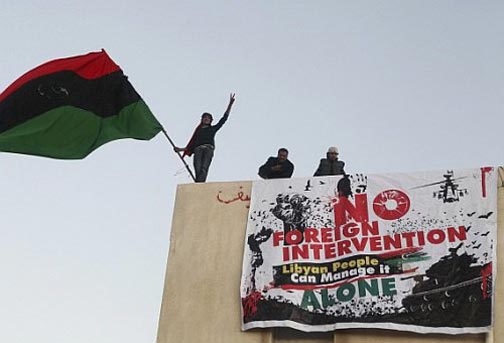 “No
intervention” banner in Benghazi.
Whoever made this had resources.
(Photo: Al Jazeera)
“No
intervention” banner in Benghazi.
Whoever made this had resources.
(Photo: Al Jazeera)
But what about those youth in Benghazi who say (for example, in a video interview with Real News) that they are opposed to foreign intervention? Pictures are being circulating on the Internet, particularly by left groups that want to politically support the rebels without having the taint of backing imperialist intervention, of a big banner on a building in Benghazi proclaiming: “NO FOREIGN INTERVENTION – Libyan People Can Manage it ALONE.” Several things can be said about this. First, these youth are not calling the shots in Benghazi. Second, all sorts of bourgeois opposition politicians say they are opposed to “foreign intervention,” by which they mean troops on the ground, at the same time as they beg the U.S. to provide a “no fly zone” – i.e., to bomb his airforce and anti-aircraft defense. That would be an imperialist act of war, no matter what the rebels say. Third, look more closely at that banner: very fancy. Whoever made that has resources at their command. Colloquial English, too – and no Arabic. Curious.
It’s also worth looking at the web sites purporting to be from Libyan youth, notably http://www.libyafeb17.com/ or http://twitter.com/EnoughGaddafi. Also quite professional, and no Arabic language site connected with them. Curiouser. However, the English-language ShababLibya/LibyanYouthMovement twitter and Facebook sites do have an Arabic web site (http://shabab-libya.com/). What do we learn there? That the “director of Youth Site for Libya” is a certain Allaedin Ezzedin, a “senior on-line marketing expert in the Bay Area, California,” one of whose role models is Hasan Al Banna, founder of the Muslim Brotherhood in Egypt. Shades of the Google marketing exec Wael Ghonim who left his posh villa in the United Arab Emirates to set up a Facebook site in Egypt that attracted many youth. And recently the London Financial Times (12 March), in an article about “Civil Society on Rise in Rebel Areas of Libya,” interviewed Ahmed ben Musa, a founder of the Libyan Youth Movement, who just happens to be a “30-year-old Halliburton employee.” Halliburton?! Are Dick Cheney’s cronies in on this?
 Something’s fishy
here, and, as you suspected, it’s all
connected … to the United States Government.
LibyaFeb17 and EnoughGaddafi are pushed by
Movements.org, the web site of an Alliance
of Youth Movements. This “alliance” turns
out to be a USG-sponsored outfit “dedicated
to identifying, connecting, and supporting
digital activists from around the world.” It
was launched by, and funded by, the State
Department in 2008 with corporate sponsors
including Facebook, Howcast, MTV, Google,
YouTube, AT&T, Pepsi, CBS News, MSNBC,
JetBlue, Gen-Next and Access 360 Media, as
well as Columbia Law School (see graphic,
right). The Alliance’s 2009 Summit was
addressed by Hillary Clinton, heard papers
such as one by State Department official
Jared Cohen (now Director of Google Ideas)
on “Moldova’s Twitterrevolution,” and
included such “youth movements” as the
Teheran Bureau, Un Millón de Voces
contra las FARC (Colombia) and the
Movimiento Joven de Venezuela which has been
active against the government of Hugo
Chávez. These are “youth movements”
made to the measure, and on the orders, of
imperialism.
Something’s fishy
here, and, as you suspected, it’s all
connected … to the United States Government.
LibyaFeb17 and EnoughGaddafi are pushed by
Movements.org, the web site of an Alliance
of Youth Movements. This “alliance” turns
out to be a USG-sponsored outfit “dedicated
to identifying, connecting, and supporting
digital activists from around the world.” It
was launched by, and funded by, the State
Department in 2008 with corporate sponsors
including Facebook, Howcast, MTV, Google,
YouTube, AT&T, Pepsi, CBS News, MSNBC,
JetBlue, Gen-Next and Access 360 Media, as
well as Columbia Law School (see graphic,
right). The Alliance’s 2009 Summit was
addressed by Hillary Clinton, heard papers
such as one by State Department official
Jared Cohen (now Director of Google Ideas)
on “Moldova’s Twitterrevolution,” and
included such “youth movements” as the
Teheran Bureau, Un Millón de Voces
contra las FARC (Colombia) and the
Movimiento Joven de Venezuela which has been
active against the government of Hugo
Chávez. These are “youth movements”
made to the measure, and on the orders, of
imperialism.
Undoubtedly, many Libyan youth have joined in the uprising to protest the heavy-handed Libyan security apparatus. But they are being manipulated by a pro-imperialist cabal of CIA assets, monarchists, Islamists and ex-Qaddafi officials, and by phony “youth movements” sponsored by Washington. Again, many of these same elements were present in Egypt in the uprising that toppled the dictator Hosni Mubarak. Unlike various pseudo-socialists, authentic Marxist revolutionaries there would have refused to join any political alliance with such bourgeois currents. But in Egypt the ballyhooed “Facebook revolution” was surpassed by a vast plebeian mobilization and a strike wave by workers who don’t “tweet” with their I-phones or friend people on social networks but fought cops in the streets. In Libya, the stage of mass mobilization was passed within a day or two, quickly turning into a civil war between two reactionary bourgeois forces, and the country now faces the threat of imperialist attack.
What would be the goal of U.S. imperialist intervention? Some simplistic leftists respond in knee-jerk fashion that the Yankees thrist for Libya’s oil. Yes, but. Although Libya is a major producer of petroleum and natural gas, only 3% of its oil exports go to the United States, while 85% go to Europe (28% to Italy alone). Moreover, most of Libya’s oil is already pumped under production-sharing agreements with international oil companies including Italy’s ENI/AGIP, France’s Total, Spain’s Repsol-YPF, Russia’s Gazprom, Petrochina, Norway’s StatoilHydro, as well as Occidental, ConocoPhillips, ExxonMobil, Shell, Hess, Marathon and BP. No doubt the imperialists would like to control it all, and to weaken Libya in the OPEC (Organization of Petroleum Exporting Countries) cartel where Qaddafi has been a hardliner, along with Chávez’s Venezuela. But Washington’s fundamental interest in Libya is more broadly geostrategic:
- to dump an erratic leader who has been and could be again a troublemaker for the U.S. in this vital region;
- to get back such assets as Wheelus Air Force Base near Tripoli, closed by Qaddafi shortly after taking power in 1969, which could serve as an important staging point for the U.S.’ newly formed Africa Command; and
- above all, to control energy supplies to potential rival powers.
As Manlio Dinucci wrote in the article quoted earlier, titled “Libya in the Great Game” (Il Manifesto, 25 February), by overthrowing Qaddafi: “The United States could thereby control the energy spigot on which Europe in large part depends, and which also supplies China.” This has long been the strategic goal of U.S. imperialism in the region. As we noted well before the 2003 invasion of Iraq:
“The real aim of the U.S.-orchestrated campaign of war threats and ultimately military action against Iraq is to graphically demonstrate the world domination of Yankee imperialism. The American rulers, from Wall Street to the White House and the Pentagon, deem themselves to be ‘masters of the universe,’ and they want to show everyone who’s the boss. An important part of this is control of petroleum supplies. Washington wants to have its hand on the oil spigot, so it can turn it on or off at will. This is directed not so much at Iraq, although the Seven Sisters oil monopolies are still upset over the nationalization of their properties there, as at the U.S.’ imperialist allies and rivals. The U.S. imports very little oil from the region, which goes overwhelmingly to Japan and Europe.”
–“Defend Iraq Against U.S. Imperialist Attack!” The Internationalist No. 5, April-May 1998
From Yugoslavia to Iraq to Libya – under Democrat Bill Clinton in 1998, Republican George W. Bush in 2003, and Democrat Barack Obama in 2011 – U.S. imperialism uses “human rights” as a smokescreen for its quest for global hegemony. ■
[1] “‘He is playing with us,’ said Major Ibrahim Fatouri in Benghazi. ‘This is the one time in recent years that he has cared what the world thinks of him’.” (Observer [London], 6 March).
[2] “Kosovo: Report alleging PM links to organ trade endorsed,” Guardian [London], 17 December 2010.
[3] CIA support for the NFSL is not only rumored, it has been detailed in Richard Keeble, Secret State, Silent Press: New Militarism, the Gulf and the Modern Image of Warfare (University of Luton Press, 1997) and Joseph Stanik, El Dorado Canyon: Reagan's Undeclared War with Qaddafi (Naval Institute Press, 2003). It was the subject of hearings in 1981 by the U.S. House of Representatives Intelligence Committee where there were objections (soon leaked to the press) to the plans to assassinate Qaddafi.
[4] Subsequently, the former military commander of the NFSL “army” showed up in Benghazi and declared himself commander of the rebels’ “army.” See “Qaddafi and the Imperialists: On and Off,” on page 14.
[5] Salafism is a component of the Sunni branch of Islam which considers the practices of the first three generations after Muhammad to be the model of an Islamic society. This includes many reactionary aspects of 7th-8th century Arab society, particularly strictures on women, that are not found in the Koran itself. While some Salafists are merely extreme conservative pietists, others are prominent in Islamist political currents promoting jihad, in this case meaning holy war, against infidels. The Wahabi sect which dominates Saudi Arabia and from which Osama bin Laden stems is Salafist, and the Libyan Islamic Fighting Group, founded by former mujahedin (holy warriors) who fought the Soviet army in Afghanistan, was allied with the Algerian Salafist Group for Preaching and Combat.
To contact the Internationalist Group and the League for the Fourth International, send e-mail to: internationalistgroup@msn.com